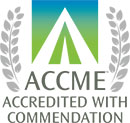Continuing Medical Education

Accreditation Statement
The American Association for Cancer Research (AACR) is accredited by the Accreditation Council for Continuing Medical Education (ACCME) to provide continuing medical education activities for physicians.
Credit Designation Statement
AACR has designated this live activity for a maximum of 18.25 AMA PRA Category 1 Credit(s)™. Physicians should only claim credit commensurate with the extent of their participation in the activity.
Credit certification for individual sessions may vary, dependent upon compliance with the ACCME Accreditation Criteria. The final number of credits may vary from the maximum number indicated above.
Claiming (CME) Credit
Physicians and other health care professionals seeking AMA PRA Category 1 Credit(s)™ for this live continuing medical education activity must complete the online CME Request for Credit Survey by Monday, April 6, 2020. Certificates will only be issued to those who complete the survey. The Request for Credit Survey will be available via a link on this webpage and via email. Your CME certificate will be sent to you via email after the completion of the activity.

Successful completion of this CME activity, which includes participation in the evaluation component, enables the participant to earn up to 18.25 Medical Knowledge MOC points in the American Board of Internal Medicine’s (ABIM) Maintenance of Certification (MOC) program. Participants will earn MOC points equivalent to the amount of CME credits claimed for the activity. It is the CME activity provider’s responsibility to submit participant completion information to ACCME for the purpose of granting ABIM MOC credit.
To receive ABIM MOC, participants must request MOC in the CME Request for Credit Survey and complete all questions. Once these steps are completed, AACR will submit your completion information via the ACCME’s Program and Activity Reporting System for the purpose of granting MOC points.
Statement of Educational Need, Target Audience, and Learning Objectives
Within the human body, microbiota heavily influence daily health. The microbiota that inhabit the gastrointestinal tract, and other anatomical sites, are an environmental factor that we are continuously exposed to. Over the last several years, the complexity and diversity of gut microbiota within and between individuals has been exposed. The collective genome of the microbiota, referred to as the microbiome, encodes approximately 100-fold more genes than the human genome. Studies have shown the influence of the microbiota on immune cell function, tumorigenesis, and more. Sequencing studies have shown the composition of microbial communities differs significantly between those who are healthy and those who are unhealthy, and thus has a profound influence on disease progression and overall health. Within the development of cancer, the microbiota has been implicated in both cause and prevention.
Over the last several years, the complexity and diversity of gut microbiota within and between individuals has been exposed. The impact of the microbiome on cancers and cancer therapy has increased dramatically, where studies have shown the influence on immune cell function, tumorigenesis, and more.
The proposed special conference aims to illuminate various areas, including bacterial, viral, and fungal pathogens, and their contributions to the development of cancers. Moreover, the impact of the microbiome on cancers and cancer therapy will also be discussed. The study of the microbiota and its effects on cancer have transformed how we examine therapies and relationships with the immune system. Tumor microenvironments, and the associated tumor microbiota, have also played a role in individualized immunotherapy, and the development of novel therapeutics.
This conference will cover a wide range of topics including the role of the microbiota in metabolism and immunity, oncogenic viruses, and the microbiota in cancer prevention and therapy.
This activity would be most appropriate for physicians and health care workers who work and are interested in how the natural microbiota affect disease progression and treatment, especially those who focus on colon and gastrointestinal cancers.
After participating in this CME activity, physicians should be able to:
1. Analyze the identification of the impact of the microbiome on cancer development and treatment.
2. Interpret the role of microbiota in specific cancers (colon and gastrointestinal cancers).
3. Explain oncogenic viruses and the role the microbiota plays in development of cancers.
4. Explain the conversation and evaluation of cancer prevention and therapy in the context of gut microbiota.
Disclosure Statement
It is the policy of the AACR that the information presented at AACR CME activities will be unbiased and based on scientific evidence. To help participants make judgments about the presence of bias, AACR will provide information that Scientific Program Committee members and speakers have disclosed about financial relationships they have with commercial entities that produce or market products or services related to the content of this CME activity. This disclosure information will be made available in the Program/Proceedings of this conference.
Acknowledgment of Financial or Other Support
This activity is supported by Professional Educational Grants and will be disclosed at the activity.
Questions about CME?
Please contact the Office of CME at (215) 440-9300 or [email protected].
